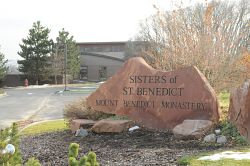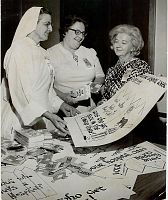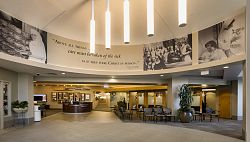Benedictines' legacy continues in northern Utah
Friday, Jan. 09, 2015

Intermountain Catholic
Photo 1 of 3
The Ogden monastery went on the market in 2013, when the sisters departed. IC file photo
(Editor’s note: In recognition of the Year for Consecrated Life, the Intermountain Catholic is featuring articles about the religious orders that contributed to the faith in Diocese of Salt Lake City. Also see the stories Ogden's Benedictine sisters, Oblates of St. Benedict continue to meet, and Benedictine receives grant for Logan parish.)
SALT LAKE CITY — Since the Sisters of Saint Benedict departed from Ogden in 2013, “we certainly feel their absence,” said Father Ken Vialpando, pastor of Saint Joseph Parish. “For every one sister there was, we have to find people to fill in for what they were doing.”
At the parish, the sisters were involved in the RCIA classes and other ministries; in the wider community they continued to work and volunteer at Ogden Regional Medical Center, administer the St. Benedict’s Foundation, and were involved with many other community organizations, including the Catholic schools and Catholic Community Services.
“They went out and spread the good word and planted seeds of faith in various pockets in the various parishes, not to mention the hospital as a whole,” Fr. Vialpando said. “I can’t imagine how eight people did that much, with their age and their health.”
The six sisters who left in 2013 were the last of the 155 Benedictines who served in the Ogden area beginning in 1946, when a small group came from St. Benedict’s Monastery in St. Joseph, Minn. to establish St. Benedict’s Hospital. The hospital was sold in 1994 and renamed Ogden Regional Medical Center.
After the sale of the hospital, several of the sisters remained at the Ogden monastery, which was built in 1980. However, their numbers dwindled and the age of the sisters increased, so in 2013 they closed the monastery and returned to their mother house in Minnesota, although they continue to pray for those they ministered to in northern Utah.
“We always knew – and we still do – that we are in their thoughts and prayers and they’re supporting our work with their love and thoughts,” said Marcie Valdez, director Catholic Community Services of Northern Utah.
At CCS, the sisters were primarily known for their support of the St. Martha’s Baby Project, which provides layettes for mothers of newborns. However, “they were always willing to help out;” whether it was donating turkeys for the food bank at Thanksgiving, or collecting grocery bags that were in constant demand at the food bank, or giving a cash grant to support CCS’ programs, “their support was always evident in so many ways,” Valdez said.
She also appreciated the sisters’ friendship. “When you have the opportunity to be in the presence of the sisters, you just feel their love as genuine joy for all of the people in the community. I think that’s one of the things that I try to hang onto and remember, is just how they truly loved everyone. That love just really radiated from them. … I miss them so much.”
The sisters also started traditions in the community, such as the annual Thanksgiving fun run and the Christmas Grove celebration.
“That’s part of their legacy as well,” Valdez said. “They started these programs that not only raised funds and food for the community, but are a way of bringing the community together.”
As the sisters were preparing to leave Ogden, they arranged for grants through the St. Benedict’s Foundation to continue to support for five years the 18 nonprofits that had traditionally received funding through the organization.
One of those nonprofits is Family Counseling Services of Northern Utah, a United Way agency.
“The sisters have been really instrumental in helping Family Counseling Services continue in its mission here in Weber County, Davis County, Box Elder and Summit,” said Curt Watson, the organization’s executive director. “I don’t know what we would have done if we hadn’t had them, because there have been some pretty lean times and they kind of helped us keep going.”
In 2013, Family Counseling Services served almost 4,000 individuals, about 90 percent of whom were at the poverty line or below. For people making $800 a month, paying for counseling can be very difficult, Watson said. “That’s the question: ‘Do I deal with the trauma … or do I eat this week?’ And most people choose eating.”
All of the organization’s clients pay some amount toward their treatment; those who received services under the auspices of the St. Benedict Foundation had a $5 co-pay, Watson said. “It’s one of those things that we always felt grateful to the sisters for, because they gave us enough” to help provide services such as anger and stress management and general life skills to women in jail, counseling for undocumented workers, and others, such as those who were affected by the 2013 shooting at Saint James the Just Catholic Church.
“We’ve tried to be very good stewards of that money” given by the St. Benedict’s Foundation, Watson said; they have put half of the money into an account so it can be extended over 10 years. Over that time, he estimates that 2,000 families will be served through the fund.
“I can’t say enough about how significant the sisters’ donations were to us,” Watson said.
At Ogden Regional Hospital, the sisters’ legacy is evident: A pylon is engraved with the Benedictine creed, there is a courtyard dedicated to the sisters with a monument carved with the names of all of those who served at the hospital, and a 60’ x 10’ mural above the entryway showing their works.
“It’s very important because we need to honor our legacy, but more important than that, we need to keep the spirit of why this hospital was founded,” said Craig Bielik, the hospital’s director of communications. “This hospital was founded to treat those who are sick, and the sisters really believed they should be treated as though they were Christ in person, and we want all of our employees … to be reminded of that fact, that that’s the reason we’re here. We’re here to treat the sick, we’re here to make sure that they are comforted, and cared for to the best of our ability.”
The tributes to the sisters also are “a reminder to those who walk through our doors that that’s how they should expect to be treated when they are here,” Bielik said. “That was what the sisters established this hospital to do and that’s what we intend on doing.”
In addition to the physical memorials to the sisters, “their spirit is within the walls and honored,” said Marcy Thaeler, the hospital’s manager of pastoral care. For example, during new employees orientation, they talk about honoring the patient and the family as though they were Christ themselves, Thaeler said, “and how you going about doing that; what that looks like in reality: body language and voice and respect and servant leadership, all those characteristics that the sisters were so good at.”
She sees that emphasis paying off. At Christmas, one of the hospital’s housekeepers, “who has very little funds, went through her closet, found all the clothes she wasn’t wearing, put them in a bag and brought them to me – she doesn’t have a car – and said ‘Marcy, I need you take these to the homeless.’ And I just thought, ‘The whole staff understands what treating other people like Christ is about.’”
Thaeler, who became acquainted with the Benedictine sisters through her parish’s RCIA program, worked at their retreat house for a time before getting involved with pastoral care. The sisters, she said, “had a huge impact on this community, and it’s not going to be forgotten.”
Bielik agrees, saying many patients tell him they came to the hospital because of the sisters, and they are glad to know the new management is continuing the Benedictine legacy.
On Christmas Eve, he gave out cards to the patients with a recording of the sisters’ blessing song, and “I literally had a patient in tears over that, she was so happy,” he said. “She loved having that with her; she held it to her chest and just cried.”
People gravitated to the sisters because of their spirituality, Fr. Vialpando said. “They are still talking about them and all the good that they had done spiritually, emotionally, physically in the hospital, and financially I don’t think you’d be able to count the cost of what they gave to the schools and other agencies.”
The sisters are pleased that the funds through the St. Benedict’s Foundation are allowing for an expansion of services in northern Utah, said Sister Karen Rose, a spokesperson for St. Benedict’s Monastery.
“Although our presence is not there, our prayers and concerns for the good of the community are still very much part of our wish for them,” added Sister Stephanie Mongeon, who is often asked to return to Ogden for events such as the annual Thanksgiving run. “It wasn’t about us; we were just avenues of God’s love for the people in northern Utah.”
For questions, comments or to report inaccuracies on the website, please CLICK HERE.
© Copyright 2024 The Diocese of Salt Lake City. All rights reserved.
© Copyright 2024 The Diocese of Salt Lake City. All rights reserved.



Stay Connected With Us